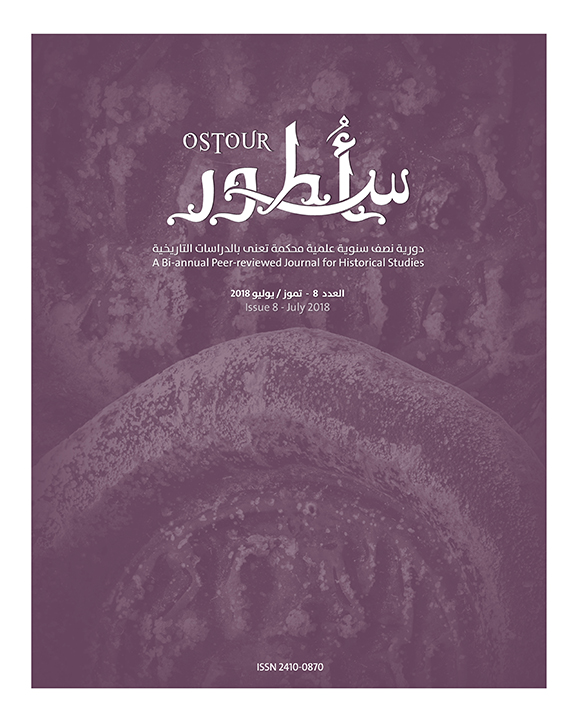
The Arab Center for Research and Policy Studies has published the eighth edition of the semi-annual journal on historical studies, Ostour. In addition to a selection of studies, bibliographic reviews, and translations, the issue features papers from the Ostour seminar "One Hundred Years after the Balfour Declaration' as part of the proceedings of the ACRPS Fifth Conference for Historical Studies: The Nakba and the Cause of Palestine in Arab History Writing held between May 12–14, 2018 in Qatar.
The Studies included in this issue begin with "How Jules Michelet Writes History" by Yassine Zainoune, addressing a gap in Arabic language writings on this pioneering figure who left his imprint on 19th century French historiography. Zainoune assesses Michelet's concept of history, along with the innovative character of, and diverse reactions to, the writings of this French historian, whose production methods and methodologies other French historians sometimes deemed to be "problematic".
The second study looks at the "The Murder of Hujr ibn Udai and the Ideological Reading of History" by Amr Osman, taking up the killing of Ibn Uday al-Kindi by Mu'awiya ibn Abi Sufyan in 51 AH / 671 AD as a template for the execution of political opponents in Islamic history, a model that would become common place. This event was the first of its kind, in which the Muslim Caliph executes some members of the community (or 'Ummah), for their political stands, making it a distinctive theme among some Islamic factions and sects. This study presents various perspectives on the incident from mediating Muslim sources and specifically from Sunni Muslim historians. The study, by analyzing a contemporary "fatwa" on the death of Hujr, provides a model for reading ideological history, and demonstrates the importance of other Islamic sciences in the study of Islamic history.
Abdel Rahman Al Mouden's study "Aspects of Relational History: Morocco and the Ottoman Empire between the Sixteenth and Eighteenth Centuries", deals with the subject of diplomatic history, as an older field of study that has recently witnessed a revival under moniker of "relational history". It also draws on the development of this same field at the University of Morocco in recent times, monitoring transformations that have taken place.
The study of "Late Piracy off the Rif Coast in the 19th Century" by Muhammed Ahmiane encompasses the piracy and brigandage of rural tribes in Morocco as a form of popular jihad (naval jihad outside the remit of the central authority) against the territorial ambitions and domination of European powers. The European press waged a rabid campaign against the perpetrators of these acts of piracy, distorting them in European public opinion. Ahmiane investigates the specifics of this piracy and how it was viewed by the Sultan's administration. How much did "boats" in the Moroccan Rif contribute to threatening European shipping lanes during the 19th century?
The studies are concluded with "Iraqi Specificities and the Refutation of the "Artificialness" of Iraq" by Nahar Mohammed Nuri. To refute the artificial state hypothesis and show that "Iraq is not artificial", Nouri explores the new spaces accorded to multi-dimensional Iraqi-isms, departing from the concept of embryonic Iraqi identity that grew from the Ottoman era of administration of the three dissimilar states of Iraq found in Baghdad, Basra, and Mosul. In so doing, Nouri demonstrates a diversity of manifestations and uses of Iraqi identity.
The previous issue of Ostour featured Thaer Deeb's translation of an article by Carlo Ginzburg entitled "Microhistory: Two or Three Things That I know about it". Following in this issue is Deeb's translation of the introduction of the Italian edition of his book The Cheese and the Worms: The Cosmos of a Sixteenth Century Miller, which stands as one of the best examples of "microhistory". Ginzburg raises issues around writing the history of the subordinate classes and their individual members, problems faced by the historian regarding the scarcity of primary documents and evidence, and theoretical and methodological dilemmas involving the relationship between the culture of the dominant classes and popular culture, the relationship between the individual and the collective, and between quantitative and qualitative research.
This edition also contains three book reviews: Rabhi Radwan's review of History of Minorities in the Far Maghreb: The Case of Christians during the Middle Ages; Fawzi Boukhreis's review of the book Soldiers, Servants and Concubines: A History of Slavery in Morocco by author Mohamed Al-Naji; and Muhannad Al Mubaidin's review of The Emirs of Houran: The Al Fawwaz as the Sheikhs of the Sardiya, by author Klaib Sa'oud Fawaz.
The journal is available for purchase on the  Ostour Website, where selected studies and reviews are free for download.
Ostour Website, where selected studies and reviews are free for download.